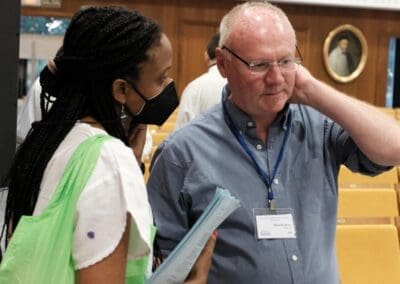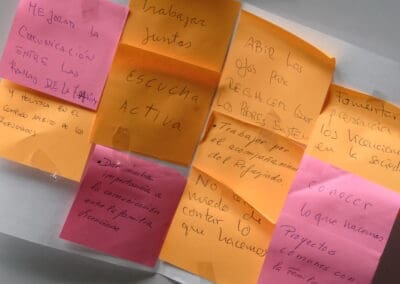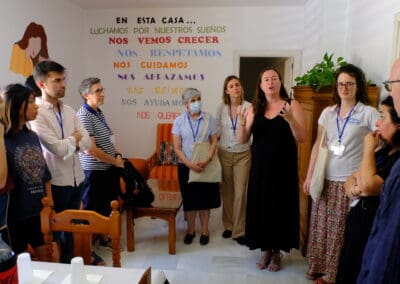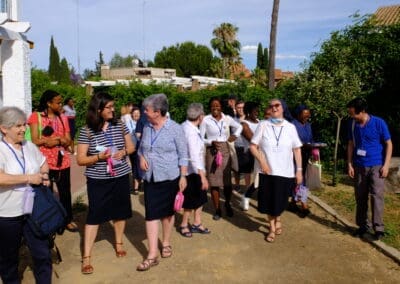
As we come to the close of our Conference, we will each leave with our own thoughts and reflections on what we have seen and heard over the past three days.
Our experiences are personal and individual.
But, as Sister Carol reminded us yesterday, we also take home each other’s thoughts.
So, perhaps I can share my thoughts which might in turn cause you to reflect for a moment on what we have all heard.
For me, the work of this Conference, and in turn the work of our Vincentian Family as we accompany the refugees, begins with the individual women and men who we meet along the way.
We met the young man from Cameroon, Andrés, who shared his tragic story of life in his country and how the Vincentian sisters provide hope here in Spain.
And we were moved by the courage of Feith from Nigeria, who has endured so much in her young life, but now stands as the proud mother of three young children.
Some of us met the people in the projects yesterday afternoon and Sarah told us of the courage of a young man, 16 years old, and of his determination to start a new life to help his family back home.
Our work, and this Conference, takes meaning in the lives of the people we meet on the journey.
In his opening homily, Msgr. Vitillo spoke of the importance to address both the spiritual dimensions as well as the technical solutions as we face the challenge to accompany refugees. And in her welcome, Sister Maria del Carmen asked us to touch the hearts of all, to look to accompany every refugee, as we journey together. We were encouraged to open our eyes to the reality of our society and look to build bridges between the rich and the poor.
Fr. Bob Maloney reminded us of the Vincentian Heritage of caring for refugees and displaced persons, starting with the war in Lorraine in the 17th century and continuing to this day. Fr Bob reminds us that we are part of that heritage – I find that inspiring, challenging and humbling. But as we have seen from the stories of our work, the Vincentian Family does not flinch from the challenge.
As always, Fr Bob drew on the experiences of the past to map directions for the future, and we will do well to heed his five hopes as we take our next steps.
Msgr. Vitillo reminded us that the Holy Family experienced life as refugees. And he drew attention to the ancient and universal value of asylum as an expression of our shared humanity. Those values are under threat, and hard work is needed in the UN and other forums to put frameworks in place, often informed by Catholic Social Teaching, to defend these basic human rights. We learnt of the 20-point plan which encompasses the framework, and its simplification into four verbs: Welcoming, Protecting, Promoting, and Integrating.
And we heard of another person on the journey: the Syrian woman who needed to bury her son in Holy Ground, before being able to move on in her life.
It wouldn’t be a real Conference without some syndicate work! And we took time out to discuss what we had heard and what we want to see for the future. The rich results were captured by Yasmine and her colleagues.
On Monday afternoon, we were confronted with the harsh reality of forced migration:
- Fr Joel spoke of many issues, including forced labour and extractive industries, but painted a picture of hope in the Melanesian Solidarity Village.
- Sister Francely told of the response to the volcanic eruption in Guatemala, and how the communities themselves guide us along the way to recovery. (Nos indican el camino)
- Sometimes, the dimensions overwhelm us and the account of the displaced people in Tigray is one example (4.5 million forced by conflict to leave their homes). Sr Hiwot told us how the Vincentian Family working together brings hope – and that they are stronger through collaboration.
- The scale of the disaster in Ukraine is also huge: 6.5 million refugees and 8 million IDPs. Fr Vitaliy made this personal for us, describing people running to get away. But also told us of the traumatized and desperate – and how the poorest of the poor are those who remain in the country and are now served by the Vincentian Family.
- Matthew reminded us that people have the same dreams, whether in London or Aleppo. They dream of shelter, food, education for their families. A better life. A simple human instinct.
From this session, I understood more about how I might accompany a refugee: the importance of language, of message (safety, hope) and of the challenge – how to proclaim the Good News to others in the midst of a tragedy?
We began Wednesday morning with some inspiring words from Yasmine, based on the previous day’s discussions.
The panel on human trafficking provided us with a huge range of emotional and intellectual challenge:
- Sr Olivia spoke of the inhuman practice of treating a person as an object. And she showed us how those 4 verbs which we heard about can be put into practice to care for victims in Ghana and Nigeria, and how the Kumasi project finds a place in the 13 House Campaign – a story of Vincentian collaboration.
- I referred to Feith’s story earlier, and I think none of us will forget being told of her experience. We take heart that she has survived and flourished, but we are motivated to do more by the knowledge that many others are not so fortunate.
- What a wonderful, inspiring testimony from Sr Magdalena! We are reminded that as we accompany the refugee on her journey, we are walking on sacred ground. We must tread carefully. And we heard again of individual stories; Mireia, 15 years old, in an internment camp and Lovad with her new baby. Those who were lucky enough to visit the projects yesterday saw further testimony to the work of Sr Magdalena and her sisters. God is truly present in their work.
- Mick Clark explained the connection between homelessness and modern slavery and the work of The Passage in London to address this. Mick reminded us, after St Vincent, to say little and do more.
- Sister Sally gave us the big picture as she addressed the question of how society can stop treating people as commodities. An economic system informed by Catholic Social Teaching shows the way and will help us to tackle the globalization of indifference. Sr Sally laid out the Vincentian response and we would all do well to reflect on these measures in our own work.
We were privileged to hear from Fr Baggio, C.S., on his work in the Dicastery for Integral Human Development, and of the very special interest which Pope Francis shows for the cause of migrants and refugees. The culture of encounter challenges to think in new ways to address the question: how can I really accompany the refugee on the journey. What are the changes that I need to make myself?
“Life is the art of Encounter”. “The stranger is the friend that I don’t yet know”
We heard that the Dicastery has published a document on how to welcome the refugee in the parish community – something for us to consider too?
The challenges to creating a new life with Sr Petra from Slovakia and David from Depaul Ireland. The journey continues even when you reach a new country. I was struck by the speed of response to need. Eight sisters welcoming refugees at the Slovak/ Ukrainian border immediately the crisis began. Depaul Ireland ensuring refugees received a warm welcome. Listening to the needs of new arrivals and lobbying to government on their behalf.
It was good to take time in Apostolic Reflection at the end of our second day, and we shared with each other our inspiration and affirmation for the work of the Vincentian Family in many different ways.
“Our hearts are burning within us”.
Then the silent performance, following visits to the projects, was a real highlight of our time together. The genuine pathos and power of the enactment of the journey of a refugee with all its trials and tribulations. The sheer energy and joy of the young performers now free to lead a better life. Well done to them and the Daughters of Charity in Seville for their great work in supporting these arrivals to Spain!
On Thursday morning we heard from Rhea – a former refugee and now a humanitarian aid professional. Referring to her personal experience she reflected how it felt to be uprooted “physically, mentally, spiritually”. How can we question the rights of refugees to seek a better life? She talked of systemic racism – the difference in our treatment of Ukrainian refugees to those arriving from other parts of the world. Our sense of privilege and superiority in thinking we know the answers better than refugees themselves. We need to be self-aware and to listen. Not impose but be guided.
In our last panel we saw how people “deal with adversity”. Sarah from Lebanon reminded us that it sometimes isn’t easy to welcome refugees. Lebanon is a beautiful country with wonderful people, but it is now in now in need of humanitarian aid itself. They do not have the resources to welcome others. What can we do to help countries who take too much of the burden? They are often forgotten or overlooked? How can we advocate for them to receive a just settlement?
Tony, like Sr Sally earlier, highlighted the hypocrisy and inequity of welcoming migrants as a commodity. We need them to pick crops on low wages, but we refuse them the right to remain and build a life. He highlighted the terrible treatment of unaccompanied children which breaks every human rights convention.
Jim talked about the importance of advocacy and using every platform we can to change the narrative on refugees. We need to tell their story and challenge false assumptions. We need to bring refugees to the tables of power and let them speak for themselves – as we plan to do at the UN in June 2023.
Jack reminded us of the horrors of offshoring refugees and how, even onshore, we restrict their rights to live and work and prosper. However, he then showed how the Vincentian Family in Australia offers community, inclusion, respect, and a place of safety in keeping with Catholic Social Teaching. Also, how we can successfully lobby government for change.
Based on what we have heard you say and the organizational capacity of the Famvin Homeless Alliance we are proposing to carry forward seven actions from this conference.
- We will help to build a network bringing together Vincentians working with refugees and internally displaced people. In support of this goal, we will develop a series of webinars and share best practice tool kits online. These will also pick up on cross cutting themes such as people trafficking, climate change etc.
- We will engage in a program which will help build capacity for advocacy at a local level using existing best practice within, and beyond, the Vincentian Family. We will also develop a mechanism to feed our collective experiences at a local level into bigger global advocacy campaigns e.g., UN and EU working with other partners and networks.
- We will ensure our global mapping exercise of the Vincentian Family is extended to those working with refugees and internally displaced people and invite them to participate in our forums.
- We will work closely with the Vincentian Family Office and the Heads of the Vincentian Family globally to ensure that we are better prepared to respond when a disaster takes place by creating a joint protocol and framework to ensure action is coordinated.
- We will provide toolkits and webinars to better understand how Laudato Si and Fratelli Tutti might inform our work and, in particular the culture of “encounter” and “accompaniment”.
- We will help any member of the Vincentian Family to develop “13 House Projects” aimed at supporting refugees and internally displaced people.
- We will continue to respond to the Vincentian Family by hosting conferences (like this one) on specific themes. Next year we will focus on Slum Dwellers in Manilla.
Thank you all for your attendance.
Mark McGreevy, OBE Depaul Group



